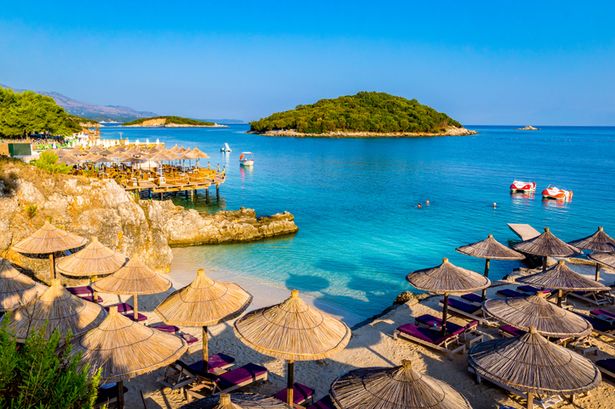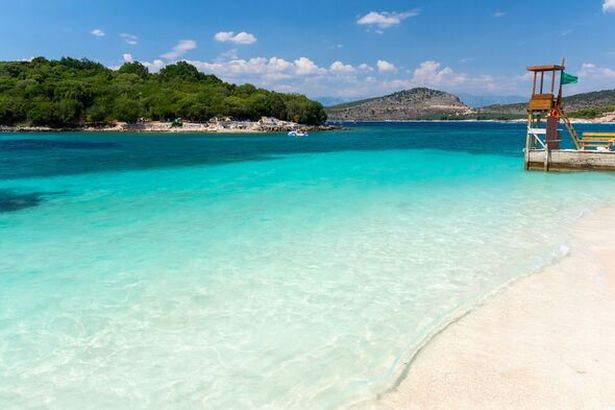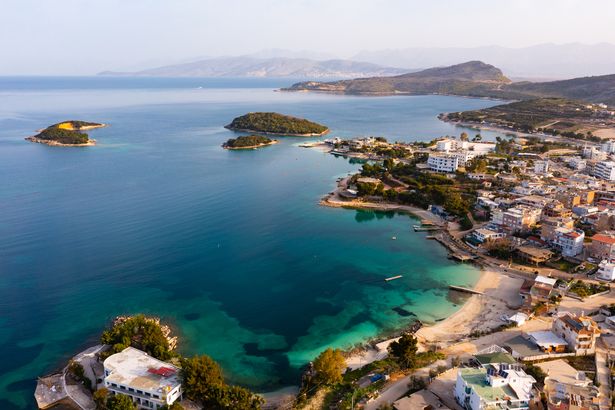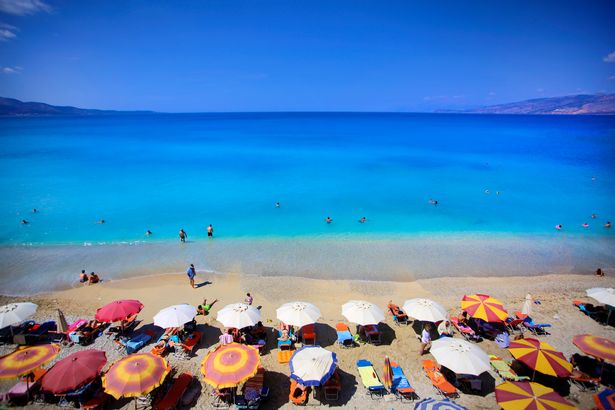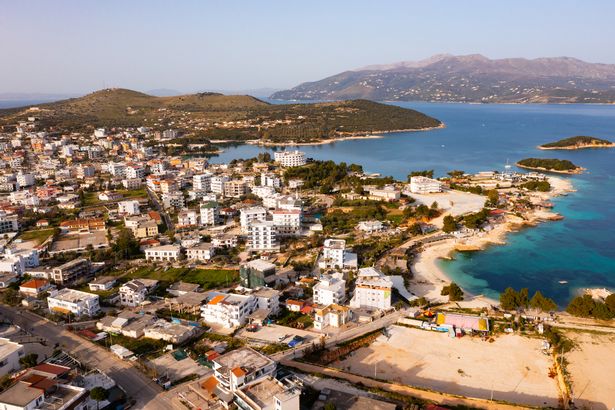The Albanian Riviera boasts stunning sights, beautiful beaches and crystal-clear waters, but experts are warning that many of the resorts where Brits are flocking are funded by ‘dirty money’
It’s hailed as ‘Europe’s Maldives’ – a stunning Balkan gem with turquoise waters, stunning mountains, and bargain prices. But behind the beauty of Albania’s glittering coastline lies a darker, deadlier truth.
The small nation is fast becoming a top holiday hotspot, with over 120,000 Brits heading there each year to soak up the sun on the now-famous Albanian Riviera, with some places just a cheap, three-hour flight away. The country is also known for having very affordable beer prices, with some as little as 77p a pint.
But while tourists flock to idyllic coastal destinations like Ksamil and Vlore, mafia gangs are allegedly laundering millions through the very resorts they’re staying in.
Experts are warning holidaymakers that luxury hotels, bars and beach clubs may be fronts for Albania’s booming organised crime industry.
READ MORE: Europe’s overlooked ‘undertourism capital’ that only a handful visit each year
According to a 2023 report by the Global Organised Crime Index, Albania is a transit country for heroin trafficked from Turkey, Iran, Afghanistan and Pakistan to Europe. It’s also a transit hub for cocaine smuggled from Latin America into Europe and the UK, the report says.
Over the years, heroin and cocaine processing labs have been discovered in cities like Elbasan, Fier and Tirana. Meanwhile, Italian authorities estimated in 2016 that Albania’s cannabis production alone was worth as much as €4.5 billion (£3.85 billion).
Besides drug trafficking, the report says the main criminal activities attributed to Albanian mafia groups – both domestically and internationally – are human smuggling and trafficking, as well as money laundering.
Albania’s mafia is now in control of most of Europe’s trafficking network. Of the 45,000 migrants who crossed illegally into England in 2022, 12,000 were Albanians.
And last year, a leaked Home Office legal document described Albanian criminal gangs as an ‘acute threat’ to the UK and ‘highly prevalent across serious and organised crime’ in Britain, including several murders. Albanian gangs are believed to dominate the UK’s illicit cocaine trade, said to be worth £5bn a year.
Criminologist Professor Xavier Raufer of Paris-Sorbonne University, who has studied the mafia for decades, says these are not just typical crime rings: “In the whole of Albania, there are maybe 30 big mafia families, with some of their traditions dating back to the Middle Ages. This makes them more dangerous as they operate with very strict rules and secretly.”
He added: “You’ll find these families all over Albania – of course, the most powerful being the one along the sea because it’s better for trafficking.”
Last year, Albania saw 39 killings, with most attributed to mafia-style assassinations. The country’s strategic position has made it ideal for smugglers, and tourism, it seems, is now part of that equation. “People involved in real estate and tourism are increasingly linked to organised crime,” says the country’s crime index report.
Professor Raufer said, “No tourist will ever see it. If you go there, you are not even able to guess it because it’s a secret.”
Former Albanian MP Rudina Hajdari blames the issue on state corruption: “Corruption has gotten higher and higher,” she said. “There have been allegations that many of these hotels in southern Albania were funded by drug traffickers.”
She explained how they set up bank accounts through friends or relatives, gradually investing in real estate to launder money. “The government clearly allows that – whether they think it’s a good idea to invest in tourism, infrastructure or just keep them in power. There’s a lot of money going into Albania that is primarily dirty.”
According to reports, customs officials in the key port of Durres have allegedly been discouraged from checking certain vehicles, allowing drugs to be smuggled in cars, buses and trucks.
In the southern seaside town of Himare, the mayor was arrested last year on corruption charges, accused of forging documents to seize government land for a private resort.
Despite it all, Albania’s image abroad continues to shine. In 2024, it saw 11.7 million tourists, almost doubling its pre-pandemic figure, with an 8% year-on-year rise in visitor numbers.
And now, even Jared Jared Kushner, son-in-law of Donald Trump, is seeing the potential for profit. He has put forward plans to Sazan Island, an uninhabited island which was once a military base, into a luxury resort.
His plans to turn the island into a holiday resort are estimated to cost €1.4 billion (£1.2 billion), and says it will create 1,000 tourism jobs.
Still, Hajdari insists the problem doesn’t lie with ordinary people. She says: “This does not in any way reflect Albanian people – Albanians are just the most generous, welcoming, nicest people when people come and travel.”
“Albania’s lack of opportunities and high corruption have created the ground for these illegal activities to flourish.”
READ MORE: ‘Finally a suncream that isn’t sticky!’ Parents’ delight as big tube of Eucerin SPF hits £10 sale
